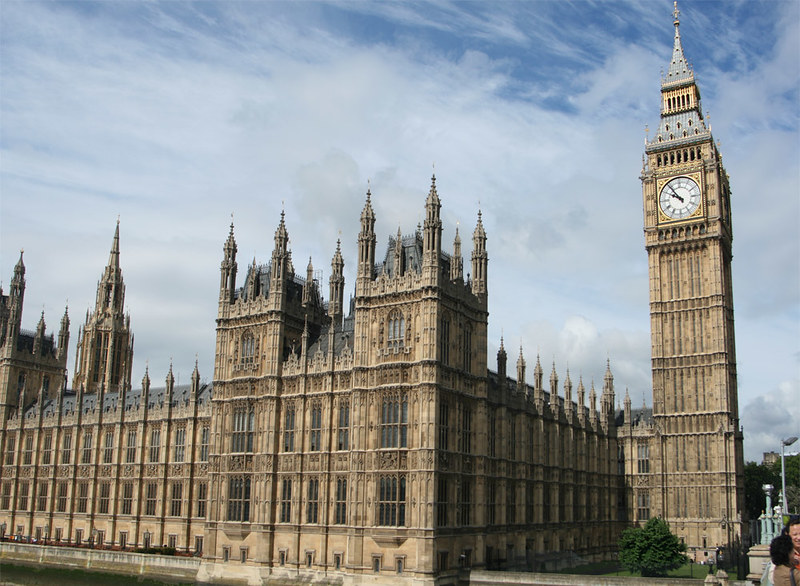A major new report by Campaign Against Arms Trade and World Peace Foundation details the disturbing level of access and influence the arms industry has on UK government.
Key findings from the report, “From revolving door to open-plan office: the ever-closer union between the UK government and the arms industry” include:
- BAE Systems had more meetings with ministers, and more with Prime Ministers, than any other private company. Two other arms companies, Airbus and Rolls-Royce, were also high on these lists.
- Over 40% of top-ranked military officers and civilian MOD personnel took roles in the arms and security industry upon leaving public service, including as employees, board members, and independent consultants to the industry, including a clear majority working in procurement.
- On average, between 2009-19, senior government officials and ministers met with their arms industry counterparts 1.64 times a day.
The report shows how the arms industry influences government policy, and how it has developed such a close relationship with government over the years that the lines between the two have been virtually erased. The consequences of this include a broken MOD procurement system, that nonetheless ensures steady profits for the UK’s top arms companies, and a lax arms export control regime that has allowed the industry to continue fuelling atrocities in Yemen and Palestine, while evading accountability for severe corruption.
Two key channels of influence for the arms industry are identified in the report:
The continued Revolving Door between government and the arms industry – principally from the MOD, but also other departments, including:
- An analysis of lists of senior MOD personnel found that over 40% of top-ranked military officers and civilian MOD personnel took roles in the arms and security industry upon leaving public service, including as employees, board members, and independent consultants to the industry.
- This included a clear majority of those who worked in procurement roles, the part of the MOD that works most closely with industry.
- While the revolving door is far from unique to the arms industry, separate research by Transparency International shows that the revolving door is far more common for the arms industry than others.
An unparalleled level of access for the arms industry to the top levels of government, including:
- Joint government-industry advisory bodies, where arms industry chiefs regularly meet with ministers.
- A dedicated arms export promotion agency within the DBT
- Regular meetings between arms companies and ministers and top civil servants on a variety of topics. On average, between 2009-19, senior government officials and ministers met with their arms industry counterparts 1.64 times a day.
- Analysis of data from a Transparency International open data portal, shows that from 2012-23, BAE Systems had more meetings with ministers, and more with Prime Ministers, than any other private company. Two other arms companies, Airbus and Rolls-Royce, were also high on these lists.
The ‘ever closer union’ and the ‘open-plan office’
While all industries seek to influence the government, the arms industry is unique in the closeness of its relationship at the highest levels. This is not simply the result of industry efforts, but as the report documents, a deliberate policy by successive governments to draw the industry into a tighter embrace.
As the MOD has come to see its relationship with industry less as one of customer and supplier, and more as one of partners and allies, the report argues that this has increasingly blurred or even erased the lines between the two. This is especially true of BAE Systems, which dominates the UK industry, and which has become almost a privately-owned branch of the state. The report argues that the flow of personnel between the government and industry is not so much a ‘revolving door’, as an ‘open-plan office’, a natural move from one part of the national security establishment to another.
Impacts on MOD procurement and arms exports
MOD procurement: The top arms companies, such as BAE Systems, Rolls Royce, QinetiQ, Babcock, and Leonardo UK, receive a very high proportion of their MOD revenue – sometimes as high as 90% – through non-competitive contracts. Moreover, they continue to receive these contracts and enjoy strong, consistent profits, in spite of a long litany of delays, cost overruns, and under-performance. The House of Commons Defence and Public Accounts Committees regularly describe the MOD’s procurement system as ‘broken’ – but while it is broken for the taxpayer and the armed forces, it is far from broken for the arms industry. The report argues that perennial efforts to reform MOD procurement are doomed to failure unless they address this far too cosy relationship.
Arms exports: The report shows how key decisions on arms exports over the years have consistently come down on the side of allowing exports and protecting industry profits, even in the face of overwhelming evidence of human rights abuses and attacks on civilians, as by Saudi Arabia in Yemen and Israel in Gaza. The government has consistently interpreted or even bent rules so as to permit exports, and has even been willing to sacrifice the UK’s reputation for anti-corruption, as when it cancelled a Serious Fraud Office investigation into corruption in arms sales to Saudi Arabia. BAE Systems in particular has often been the key beneficiary of these decisions.
The report’s author, CAAT Research Coordinator Dr. Sam Perlo-Freeman, said:
“This is a broken system. No industry should have this level of influence over government, especially one that deals in death and destruction. This level of influence is profoundly undemocratic and means that shareholder profits are protected at all costs – even if this means complicity in appalling war crimes. Radical measures are urgently needed to break the arms industry’s stranglehold on government policy.”

